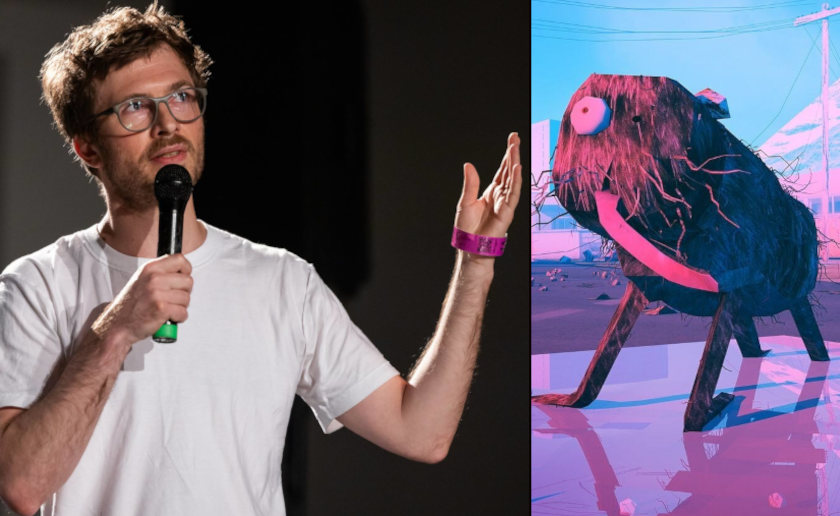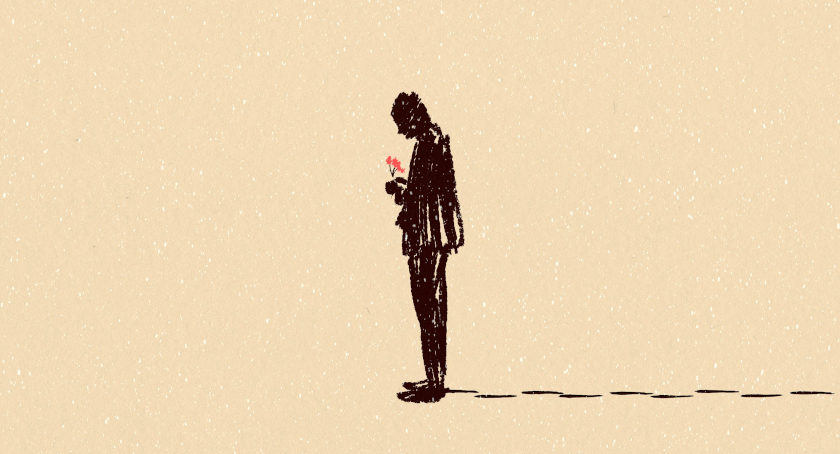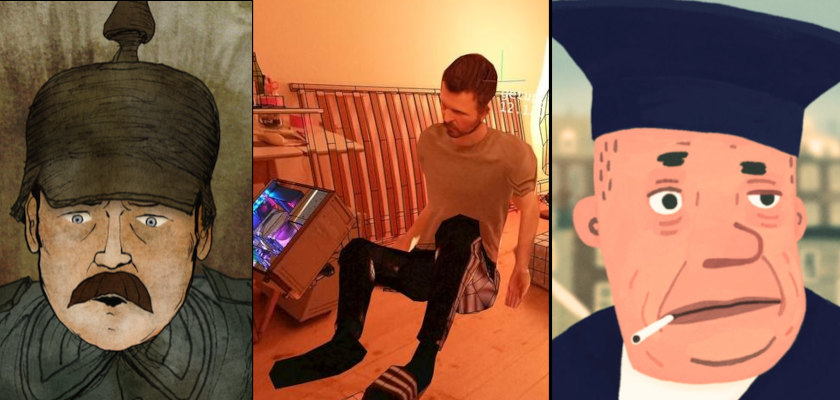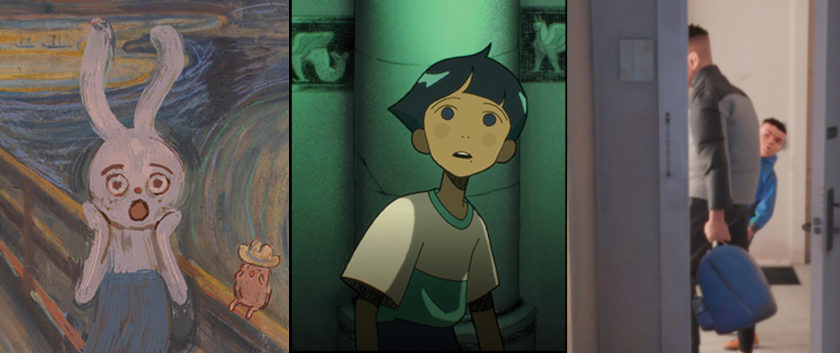Nikita Diakur: The Mechanism of Earning Money Online with Short Films Is Not Really Happening (Indie Online 2020 Project)
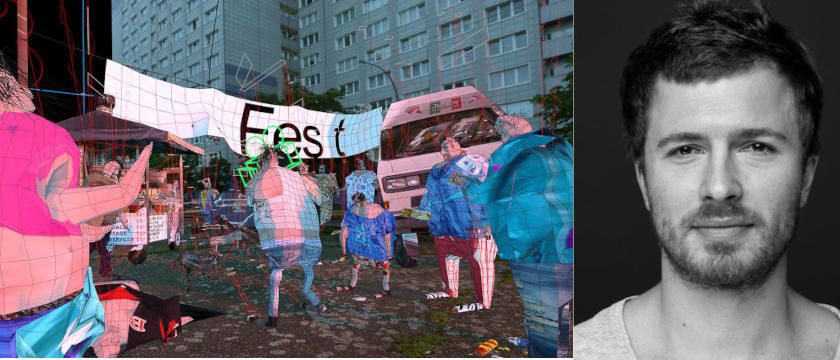
In our interview series of content consumption and distribution online (part of the Indie Online 2020 research project headed by Michelle Kranot, and supported by The Animation Workshop), Viborg, Denmark), we investigate ways of being online and their effect on independent animation directors -and their response as well.
Our current participant is Russian-born, Germany-based acclaimed animation director Nikita Diakur (Ugly, Fest).
VK: What did you lose and gain during the lockdown?
ND: I lost human relationships. People I'm not able to be there with; I gained more time to work, which is a good and a bad thing.
VK: Why it's a bad thing to work more?
ND: Because I cannot find better ways to use my free time. I'm not really annoyed by the lockdown itself, but by its consequences. I don't work because of the lockdown -I would do it independently of the lockdown. I have more personal projects advanced during the lockdown; I also have clients' work, which are actually quite nice. Mainly because the latter let me do whatever I want, which also turns to be a kind of a personal project as well. The consequence of this lockdown was uncertainty: deadlines being pushed further, clients won't know if they're going to do the things promised (such as planning ahead their events). You have to stay flexible. I'm somehow expecting every job to be canceled.
VK: Did you have to shelve a personal project because of the lockdown?
ND: Luckily, no. For some reasons, I had more personal and clients projects during the lockdown than before the lockdown. I started production on a short film last month; it will be on till mid-2021. I'm doing it together with MIYU Productions, and it's called Backflip. It's about me in a virtual world learning backflip. I'm doing it together with a programmer, Max Schneider, developing all the technical bits. What you see on my website is actually a learning thing: me learning to stand up and balance.
VK: So, you'll be the protagonist.
ND: My avatar will be the protagonist. I would love to do a backflip, but it's dangerous -so, I let my avatar do it. The idea came before the lockdown. I had a residency at Viborg till autumn 2019, and the idea came in there.
VK: So, it was business as usual. Has this been fully financed?
ND: It is about to be fully financed, but presently I have just enough money for me to get by. We're expecting results by next month. I'm trying to finance it with my own money for the time being, and then hopefully everything will be recovered in the end.
It's a nice situation to have enough money for a short film, and not be compromised too much. I made some stupid purchases, like a super-expensive camera, which costs more than I could have spent. Silly budgeting on my side.
VK: Would you care to save you time (instead of your money) in order to watch things?
ND: I'm really bad at watching things online. I haven't really tried it. If I'm at home, or in my workplace in front of my work computer, then I'm officially at work, and I watch things that don't stress my brain too much. So, I go to YouTube and watch stupid stuff. I don't watch online film festivals; I would have to be totally focused on that, and I cannot do that in front of my workplace. So, I feel kind of guilty. The online festivals don't really happen for me, it won't work -even though it might work for other people.
I was going non-stop to festivals for two or three years, and it was an amazing experience, me at the cinema watching the films. I've watched enough films to lay back now and do my own films. However, if time passes and we have a lockdown for another two or three years, I'd definitely go and watch films online.
VK: But apart from online screenings themselves, there are panels and masterclasses etc., all this educational content.
ND: Yes, it's true, you can do many things online. But you could do it even before the pandemic. There were a lot of masterclasses and related stuff. I guess during the pandemic those became free to watch or more people demanded those. You can certainly learn a lot of things on the Internet, but it really doesn't depend on the pandemic.
VK: What's the essence of the celebrated festival experience?
ND: You get to watch films in a certain way. You don't get distracted, you're in a room with other people; the film has a bigger influence on you. At a festival, you obviously meet all your friends, meet many people and make new friends. This is something that you would never get with an online festival.
VK: Let's make a crazy hypothesis. Suppose you were allowed to go to a festival and meet people in small groups, but you were not allowed to screen your festival at a cinema hall -it would have to screen online. Would that be the second best solution for you?
ND: It's definitely good to meet people than just have the whole festival online. Distribution of films online is a different thing; but I'm a computer person, and sit on the computer the whole day. If I'm going to spend the rest of my time watching films and meeting people online through my computer, I'd say it's a non-human experience. If there's a way to meet in the future in a virtual environment, it might be an option. But I'd really have this contrast to my computer life and go out and meet people.
VK: What was your most depressing moment during the lockdown?
ND: Not being able to travel: it's not depressing, but just annoying, and you have to deal with it. I'm lucky that I'm in Germany, and the lockdown is not as strict as in other countries.
VK: Do you have the feeling of an animation community being strengthened during the lockdown or it's just business as usual?
ND: I think people really try to make the best of it. But if I compare it to the feeling you have when you actually meet people at a festival, it's not comparable. It's obviously nice to catch up with people over the phone or Skype etc. but a shot of vodka at a festival is better.
VK: What happens if your next film has to premiere online?
ND: Many of my friends who had already finished their films did not premiere them online; they were waiting for the real audience. I already put online my second film, Fest, before any festival. With Ugly, it was the opposite: it went to festivals first, and I tried not to put it online too soon. If I had a film like Ugly ready in April 2021, I would now put it online as well; I wouldn't wait for the pandemic to pass.
Watch Ugly by Nikita Diakur
VK: Do you actually feel the need to adapt and invent new ways to work during the crisis? And has this influenced you in the way you construct your creative ideas? Or, perhaps this is something ordinary, since most of your work is behind the computer screen anyway?
ND: It's mainly practical things. You need to be ready and be flexible with your work. If you happen to have an obstacle you didn't foresee, you'd have to be able to switch to something else. You cannot take things for granted, during the pandemic and after the pandemic. Therefore, you need to have a plan B, always ready.
VK: I'm not asking you to be a prophet here, but do you think that in one year from now we'll have different online ways to showcase our content?
ND: I think that all the knowledge festivals got through their online screenings will definitely remain; festivals will keep the infrastructure for that. I think that, if we have a vaccine and we can meet again, it will take time for us to get used to it again, shake hands and hug. But I am optimistic that we can definitely go back to normal.
VK: You said earlier that in this online world your films would co-exist with stupid things to watch. For you, it might be obvious to distinguish the two when navigating the online content, but do you think it would be the case for others as well? How to filter this online content?
ND: In the online world, you have a platform for everything basically, which is YouTube. You can still put your stuff on YouTube and coexist with other stuff, and you can find your niche audience there. If you have quality content, you'd have your audience in the end, even if it's not the same amount of people who watch stupid stuff. And you could still make some profit from it. The only thing is the mechanism of earning money, which for short films it's not really happening. I'm not sure how this can be solved, it's a different question.
You can use other distribution methods of putting things online. I've seen other people trying to do it, but I haven't seen any success with it yet. I think that even Vimeo is getting worse over the last years in terms of that. It's becoming a corporate environment and it doesn't speak to artists anymore. You don't really get the same amount of feedback as before. It's a bit of a messy place, but for me YouTube now is the only place; or you make your own website and you show your films there.
Watch Fest by Nikita Diakur
VK: Do you use Instagram?
ND: I do. Instagram is the same thing as YouTube mostly. There's a lot of stupid stuff, and of course, your friends' accounts which are interesting. I think Instagram works better than Facebook right now in terms of audience reached. Even though it's difficult for short films, since Instagram is not made for hosting films more than one minute in duration.
VK: Another hypothetical situation. 10 years from now there's a Martian spaceship with creative artists coming to your place. We now have covid-20 in Earth; we have the accumulated experience of dealing with covid-19, but they don't. What do you tell them?
ND: I would definitely give them a vaccine, if they are not allergic to that. Regarding life lessons, I'd tell them to stay adaptable and have a plan B. Also have patience, a thick skin, and be reasonable and nice to each other. I think some people get very stupid when they have problems, and it's not nice side of human nature.
VK: How do you define stupidity in this context?
ND: Stuff like buying toilet paper or not respecting the importance of masks. People can be very aggressive as well, and that's not helping the situation. We're still going through the whole thing
VK: Do you feel more adaptable in October than in March?
ND: You have a thicker skin, you know how to deal with the situation. You wear a mask, you practice distancing; you know that if you get it, you can cross your fingers and get healthy -or not.
In animation, you do practice social isolation anyway; it's you and your computer screen, and you cannot give each other covid. I think there's many animation productions happening right now during covid. Since many client jobs were canceled, people are hopefully doing their own stuff. So, there will be many post-covid animations and films -animations more than live-action films.
VK: I was wondering whether this animation would have a content also influenced by the times it was produced or it would not be related to that at all.
ND: Some people would probably be influenced by it; I've done a little animation about toilet paper, but that's it. I'm already annoyed by the covid, so I don't want to put it into my films. I'm not really looking forward to a genre of covid-19 films.
-
Read Also: Our Interview Series on Independent Animation Online (Indie Online 2020 Research Project)
About Nikita Diakur
Nikita Diakur, born in Moscow, graduated with his MA Animation from the Royal College of Art in London, and is now working as an independent director and producer in Germany. His films UGLY and FEST received critical acclaim at film festivals around the world, including the top awards at Ottawa Animation Festival, Bristol Encounters and VIS Vienna Shorts. His signature style is a crude and interactive approach to story, design and animation, all embracing spontaneity, randomness and error. Nikita Diakur has given talks at Playgrounds, Pictoplasma and FMX, lectured at art academies in Berlin, Weimar and Vienna, participated as a jury member in Animafest Zagreb and Linoleum Kyiv, and recently undertook residencies at Q21 and the Open Workshop. Since 2017, Nikita Diakur is a member of the European Film Academy.
The interview was conducted October 2020 (interviewer Vassilis Kroustallis). It is part of the Indie Online 2020 research project, headed by Michelle Kranot and supported by The Animation Workshop/VIA University College, Center for Animation, Visualization and Digital Storytelling, Denmark.Viborg.




